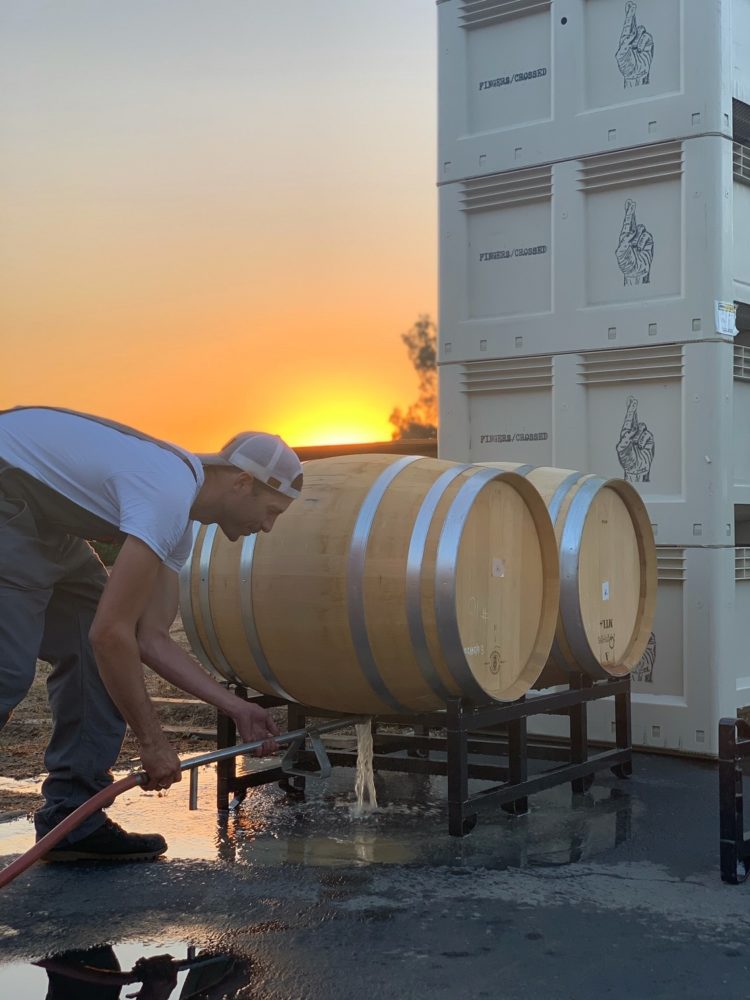
A former barista champion and a Harvard-trained psychiatrist
lay it on the line for their small winery
“There comes a time in your life when you focus solely on what you believe is right, regardless of what everybody else is doing.” – Alexander McQueen
I first meet Julia and Nikolas Krankl, of Fingers Crossed, on a cold January afternoon in Paso Robles. They’ve travelled about three hours north of where they and their winery reside – the small township of Ojai, California, known mostly for its free-spirited bohemian culture set against the stunning backdrop of the Los Padres National Forest. Looking surprisingly energetic following what I, at the age of fifty-six, consider to be a full-on “road trip,” they’re young and vibrant as they swiftly climb a flight of steps toward the venue where we’ll be meeting. Fully prepared, they’ve even packed wine glasses for the three of us. Sophienwald. “We find the aeration can make a big difference in the presentation of the nose and flavor,” Julia Krankl says. “It’s about us controlling the few things we can, to let the wine show its best.”
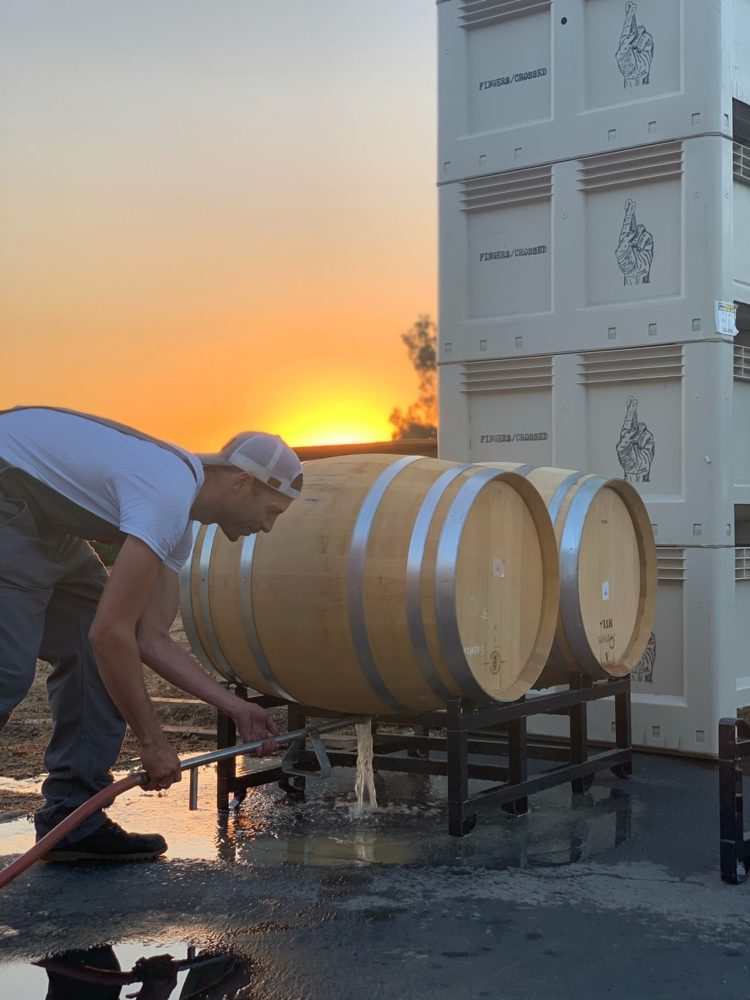
As we’re sitting down to chat, I learn that their children, Mila, six, and Lorenzo (“Enzo”), seven, are knee-deep in remote learning and have been for over a year. “We don’t have a big house, but when the pandemic happened, we knew the kids needed a school space,” Nikolas says. “So we piled everything into 40-foot containers, emptied our garage, and converted it into a classroom. I’m glad we did, because here we are, a year later. It’s their separation from the house. We call the garage the ‘school’ now.” Still, they say, nearly in unison, “It’s been a rollercoaster.”
Nikolas, wiry and lean with closely shorn hair, sets up the glassware while, Julia, warm and friendly but calmer in comportment, lines up the wines and decanters at the table where we’ll be sitting. Born a week apart in May of 1984, the Krankls have been together since meeting as undergrads at the University of Arizona, although they lived near each other briefly, unbeknownst to one another, when both were attending daycare in the San Fernando Valley. Julia, who was born in Japan and lived there for a year, lived in Southern California temporarily before moving to Arizona, where she spent her formative years. Nikolas was born and raised in the San Fernando Valley. “I’m an Angeleno, through and through,” he says.
At the University of Arizona, Nikolas was studying journalism, “mostly because I enjoy writing,” he tells me, while Julia studied chemistry (pre-med). “I knew from early on that I wanted to be a doctor.” While both were seniors, they lived on the same property just a mile from campus; Julia in the main house with four other students, and Nikolas by himself in a small guest house out back. “It was 500 dollars a month. All-inclusive. That was fancy by Tucson standards.” He continues, “I was studying journalism, but I had a love of Texas Hold ‘em. I still do to this day.”
It was 2005, and on-line poker was experiencing a boom. “It was all the rage,” he says. “We would play in little home games. Friends would get together, and we’d have drinks and play poker, and I loved that. I grew up doing that with my mom.” He explains that though the pots might not seem big these days, they seemed big to a college student. His computer would often freeze, though – the wi-fi going out – during big bets. “You would know that in a certain amount of time, your hand would be counterfeited and refolded. If you were in a spot where you felt you were going to win some money, losing the wi-fi connection was a problem.” Nikolas would find himself running into the main house to turn off and then restart the modem. It was during one of these frantic moments that he met Julia. “My room was near the back door,” she says “where the modem was, and he was always rushing in. I kept wondering, who is this guy who keeps running into the house in his boxers?”
They eventually found each other playing poker one night during a communal game. When Nikolas misplaced his phone that night, Julia called his number to help him locate it. They now had each other’s digits. Shortly thereafter, Nikolas sent Julia a message inviting her to star gaze. “If you’ve been to Tucson, you know the sky is breathtaking. We have stars here too, but nothing compares to that sky; no light pollution.” While sitting on a rooftop, stargazing, “the sparks flew,” Nikolas says. “We hit it off very quickly. We knew there was a strong attraction to one another. Not long after that, we moved in together.”
When Julia applied and was accepted to Harvard Medical School, Nikolas followed her to Boston. They’d only been together for one year. They had no family or friends there and didn’t know a soul in the city. “That really cemented our relationship,” he tells me. They moved into what turned out to be a Section 8 housing neighborhood. “We didn’t have any money,” Julia says. “It was a harsh and humbling experience. We walked to the grocery store with a shopping cart. A child got shot in a drive-by while we lived there. It taught us to count on each other and hardened us in a good way,” Julia says. Nikolas adds, “Looking back on it now, I feel like our blades have been sharpened together by that experience. We have more in our tool kit.”
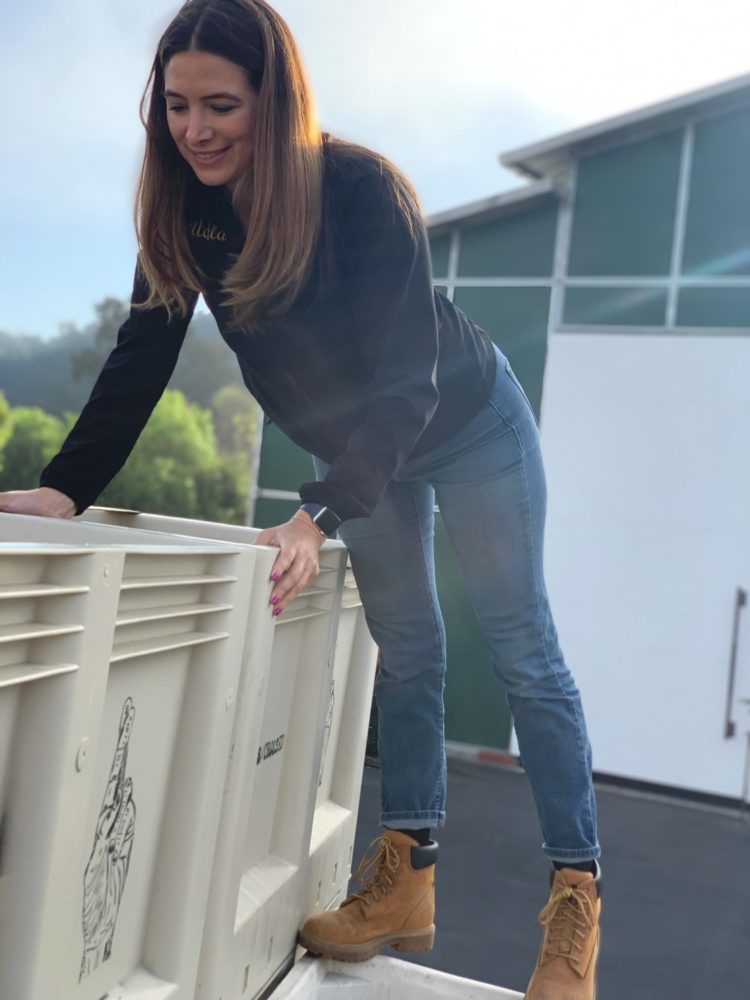
Being at Harvard tested Julia. She didn’t come from a long line of Ivy Leaguers. Her GPA and family income earned her financial aid for medical school, but just enough to scrape by. “There were students there with 12-bedroom family homes in Maine. It was a totally different world from what I grew up in.” Nikolas took up employment writing for a poker magazine. “That was the highlight of my journalism career,” he says now. They sent him to cover tournaments, in locales as far away as the Bahamas, and he got paid a dollar a word. “I thought I’d made it, but I quickly learned it’s really hard to support yourself as a journalist.”
To supplement his income, he took a job at a local ice cream parlor called JP Licks. He didn’t have a car, and it was only a block from their apartment. They specialized in homemade ice cream and roasted their own coffee. “My family was into coffee and I wanted to learn how to roast, but talk about humbling,” he says. “You go to a Harvard cocktail party and one person’s dad is an advisor for Obama. Everyone’s so prestigious and fancy. And here’s Julia saying, ‘This is my boyfriend Nik.’ And they ask, ‘What do you do? And I say, ‘I work at JP Licks scooping ice cream.’” He admits it was an embarrassing experience at first. “If you’d had an ego, you wouldn’t anymore. And that was a good thing. It grounded me very much.” They were both 22 years old at the time.
Julia found the experience humbling for other reasons. Observing the overt racism in what she calls a “segregated” Boston was “hard for both of us. It was a time of finding our identity. I’m half Mexican. He’s half Jewish. Boston – and Harvard to some extent – forced you to ask, ‘What is my identity?’ I’d walk down the street and people would ask, ‘Are you Spanish?’ It was uncomfortable. When we’d walk through certain neighborhoods, locals would tell us we did not belong there. Some friends did not want to come over to our apartment because our neighborhood was considered dangerous. Never before in my life had it been so blatant, the line in the sand between the haves and have-nots.”
While at JP Licks, Nikolas explored his nascent love of coffee. He’d had a mentor in his grandfather Lawrence, or Lorenzo, as friends called him in Italy. “He and his Italian friends would go to coffee – four or five times a day – and he was obsessed with that kind of camaraderie. I think he was ahead of his time with regard to specialty coffee in the United States. When we went to restaurants, we would order an espresso after the dinner, and he would go back into the kitchen and show the waiter how to pull a proper double ristretto. When I started getting into coffee, he was right at my side. Eager.”
When Nikolas expressed an interest in having his own cafe, his grandfather – who was in construction law and enjoyed finding and restoring old historic buildings – helped him buy an old brick-and-mortar shop, The Taste of Newtonville. The Krankls renamed it “Taste.” After attending classes all day, Julia would work and study at Taste in the evenings, doing what Nikolas describes as unglamorous, but critical work. “I’m more analytical,” Julia says. “If only five people ordered a menu item in a week, I would scratch it off the list.” Taste cafe ultimately helped the young couple feel connected and rooted to Boston. High schoolers from a school down the street became regulars. Locals came in often. “It started to feel like home. Nik would work there 12- to 14-hour days, seven days a week, while I was doing clinical rotations 80 hours a week and studying in Taste’s basement. We were grinding so hard then, but things were finally clicking for us in Boston.”
While exploring ways to market their cafe, Nik discovered the Barista Championship. “It’s a real thing. I’m not making this up,” he says. As described on the competition’s official website, “In 15 minutes, the barista must prepare and serve espressos, cappuccinos, and a personally designed signature beverage for four sensory judges; all while being assessed on their preparation abilities by two technical judges.” Nikolas took to it immediately. “It scratched many itches for me. It requires an extremely narrow focus, and there’s a competitive edge to it. That’s what I like about poker. Trying to be the best, trying to win at something. Those types of things get me excited.” “It makes us chuckle to think of those barista competition days,” Julia adds. “Lugging our own table settings, coffee cups, grinder, coffee, milk carafes, steaming pitchers, scales, a butane torch (!) all over the country. The TSA must have thought we were quite bizarre.” At one point, Krankl placed second in the United States Barista Competition. “That was the pinnacle of that career. It was a fun chapter,” he says.
When Julia applied and was accepted for her psychiatry residency at UCLA, Nikolas was left with the prospect of selling their cafe. He ultimately found the perfect buyer in legendary coffee roaster George Howell. Their move to Los Angeles proved fruitful. “Unlike at Harvard, I was in my zone at UCLA during my residency. We were close to Nik’s family, and the weather was great. I loved what I was doing. It just felt right.”
While she was in the first year of her residency, he was once again struggling with what to do for a living. “Do you notice a theme here?” he says, smirking self-deferentially. They had considered establishing a West Coast coffee roastery, but the idea proved too expensive to pull off at California real estate prices. “And it wouldn’t have been interesting to us to do something just based upon scale. It wouldn’t have been fun to make a lot of coffee. We just wanted to make the best coffee we could make.” Even so, Nikolas says, the patina had worn off coffee making for him. “The problem is that the best cup of coffee on the planet can maybe sell for…five dollars? Six? And the worst cup of coffee in the world? One or two dollars. So, you’re talking about a three-dollar swing between the best and the worst in the world. To me, that became, honestly…disheartening. I’m mostly driven by creativity, risk taking and competition. Those are the elements that define who I am. But I’m also pragmatic about business, and I started to feel that the specialty coffee industry was unsustainable.”
Instead, he went to work with his aunt, famed chef Nancy Silverton, who at the time was collaborating on a bakery and burger joint at the Farmer’s Market off Fairfax in Los Angeles. They were called, respectively, Short Order and Short Cake. They hired Nikolas as a consultant, establishing their single origin coffee program. “The space turned out lovely, and I met so many interesting and talented people along the way, such as Amy Pressman, Bill Chait, Walter Mansky, and Phil Rosenthal, but my eyes were wandering towards wine.”
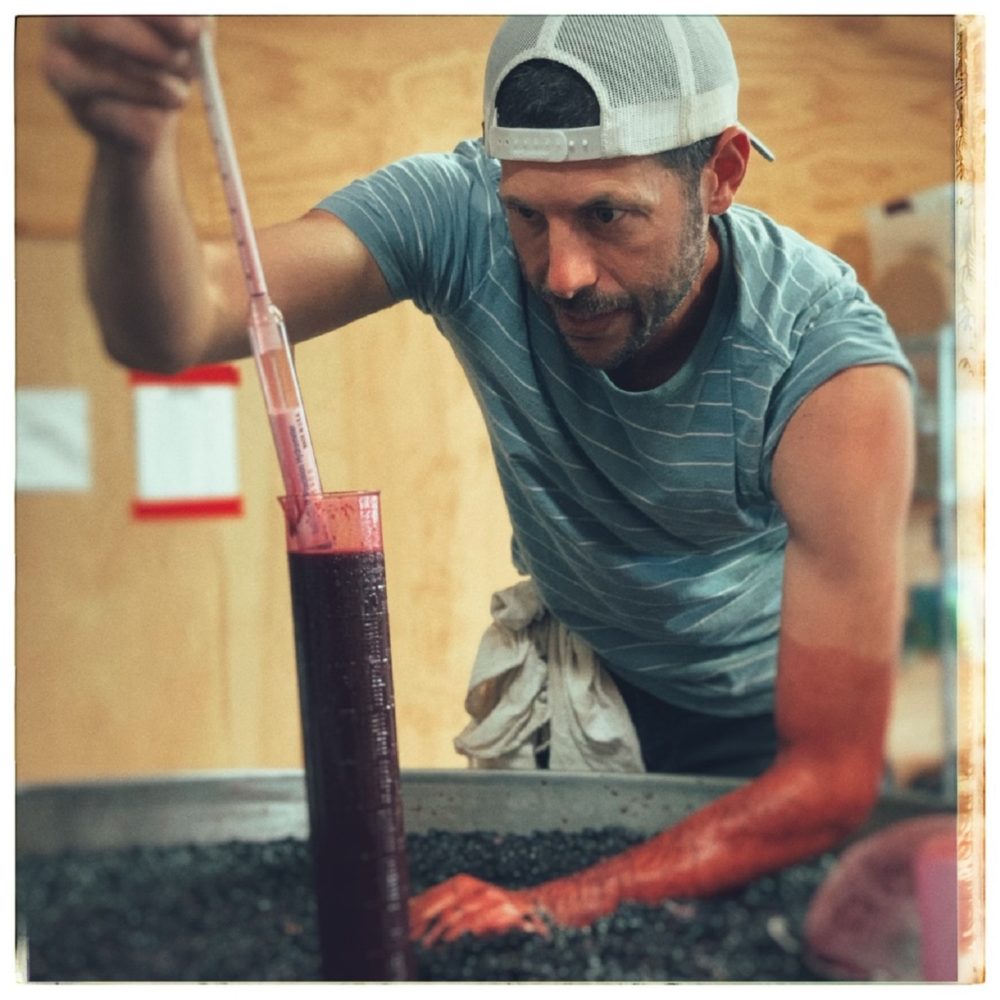
It was around this time that he began to wonder if he should explore winemaking, as his father, Manfred Krankl, had done, and continues to do, very successfully at Sine Qua Non, one of world’s most iconic wine brands. “It got to the point where I started to wonder why I hadn’t even entertained the idea before. In 2012, that thought became a reality when Manfred and Elaine hired me to work for them.” They took a risk and bought a house in the Ojai Valley, just across the riverbed from Sine Qua Non, which they can see from their backyard. While Nikolas worked at the SQN’s TTT (The Third Twin) vineyard in Los Alamos, Julia commuted daily to UCLA. Though they didn’t yet have kids, Julia was pregnant, and the long commutes, coupled with working far apart from one another, proved stressful for the young couple. “It was a really hard time for us, but we just put one foot in front of the other and kept on working hard. We’re very committed as a couple, so even adversity isn’t going to do anything to us.”
He says now his only intention was “to learn how to make wine from the master. There was no special treatment, and I wouldn’t have wanted that anyway. Every employee was held to the same standard. They expected me to forge my own path and find my own way in the company and in life.” Under the tutelage of his father, Nikolas learned to do everything from pruning grape vines and working the vineyard to racking, sorting grapes, packing boxes…you name it. “It’s a mom-and-pop business, so you do everything. I’m extremely fortunate for that opportunity, because when you start your own business, you have to do everything, too.”
He immediately fell in love with winegrowing and winemaking. “I got to work with my hands. I loved seeing the transformation from grape to bottle and seeing the extra efforts in production translate into a qualitative difference. I began reading Robert Parker’s The Wine Advocate and buying the cheapest wines with the highest ratings. It was really fun,” he says of those early days.
Just two years later, though, his father was in a serious motorcycle accident. “That really changed the whole dynamic at Sine Qua Non, because if someone is imagining Manfred sitting in a cozy chair just waving his wand…well, that’s just not the case. He is very hands on. He’s involved in every single aspect. Not having him around during his recovery felt like if the Patriots lost Tom Brady.” He says now that the pressure to not let his father down was immense. “It was crucial that we not screw up.”
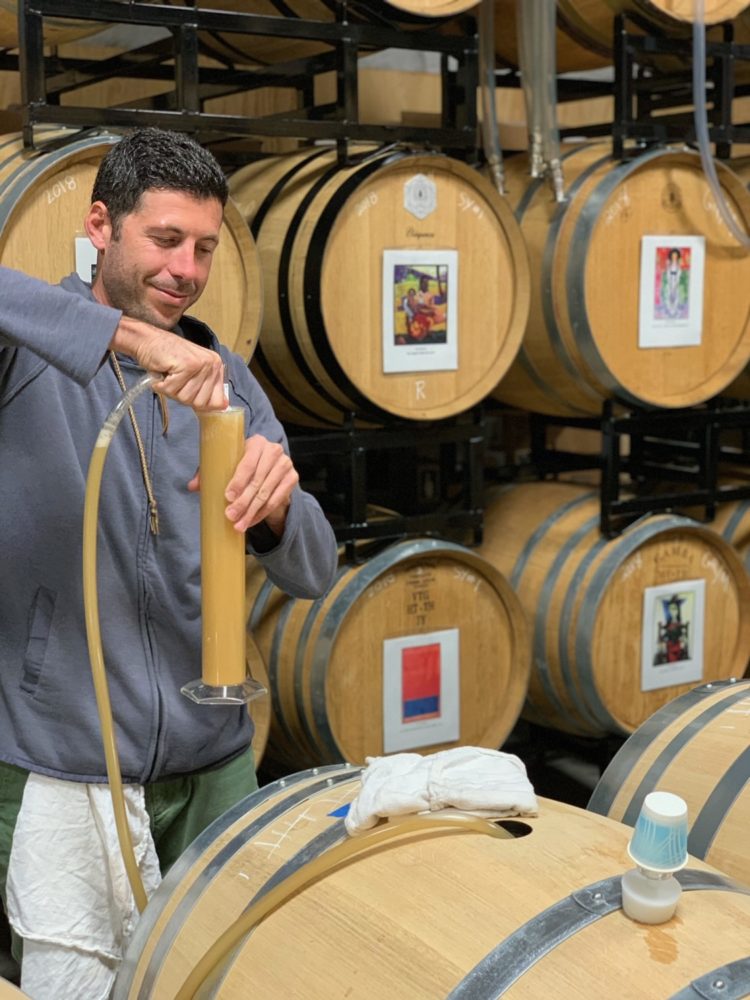
With the added responsibilities, though, came a newfound confidence. “If you always have a safety net and someone to catch you when you fall, maybe you take fewer risks. But the safety net was taken out from under us, and we didn’t fall – we did great. That was because of the entire Sine Qua Non team. Manfred and Elaine built that team.” After emerging through the other side of that tumultuous time, and with Manfred back in the driver’s seat, Nik contemplated starting a winery.
Was breaking the news to his father difficult? “I thought it was going to be a difficult conversation to have. I didn’t want to leave Manfred and Elaine hanging.” His father reacted differently than he expected. “I think there was a small part of him that was happy about it. After all, he’s a pioneer and a trailblazer. Maybe he saw a part of himself in my actions. I had all this fear leading up to telling him, but he was great. ‘Whatever you need help with. We have fruit,’ etc. It felt great. Now we just had to figure out how the fuck we were going to do this.”
Three years later, in 2017, they launched their winery, Faethm. They began by converting a 2,000 square foot barn on their property into a functioning winery. “It took a lot of work and our whole life’s savings, which wasn’t much, but we did it.” The Faethm name didn’t last for long, though, as Babcock Winery, located in the Sta. Rita Hills of Santa Barbara County, had trademarked the name “Fathom” for one of their cuvées. They initially tried to trademark the Faethm name, but one and a half years later, with thousands of dollars paid to attorneys, the Krankls tapped out and chose another name, Fingers Crossed. “The first and only wine under Faethm was called Fingers Crossed, a good luck reference for a successful first vintage, and also to protect us from losing our home and winery in the Thomas fire,” Nikolas says.
They founded the winery as a partnership, with Julia joining Nikolas in the vineyard, cellar, making the artwork, and every other phase of operations, while still practicing psychiatry. Though she didn’t grow up around wine, she had a passion for cooking. “Cooking was my saving grace throughout medical school. It was my outlet. It still is.” Her first exposure to wine was Sine Qua Non. “That set a high bar,” she says, chuckling. The pair fell into a natural rhythm working alongside one another at Fingers Crossed. “Julia doesn’t have any training, outside of working with me, so when she’s thinking about it and learning about it, it’s almost like it’s through the lens of a child, and I don’t mean that in a bad way. It’s an unassuming, pure way. If I were to say, ‘We’re going to ferment 50 percent whole cluster on the Grenache,’ Julia wants to know ‘Why? What does that mean? What does it do?’. It’s refreshing. Julia’s curiosity challenges the status quo of what I’ve learned. Our house style or thumbprint comes from my training being subjected to Julia’s inquisitive mind. That leads us to do things differently, or not, depending on the discussion,” he says. They found themselves happy with the wine that ended up in the bottle, but unsure how it would be received. Julia tells me, “Who are we to say what’s good or not good? Ultimately, we had to make a wine we wanted to drink.”
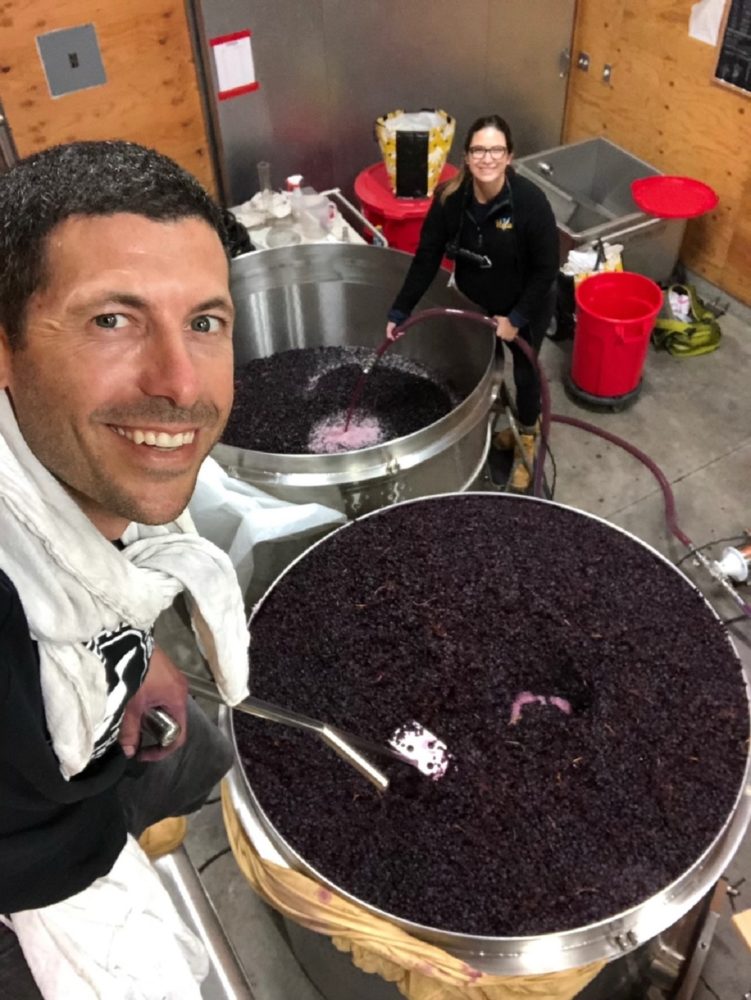
“You don’t get to blend your way into a great wine,” Nikolas says, “or blend your way out of a bad wine. When we go through and make our blends, we’re not looking for a correct answer. It’s more about ‘What are we trying to accomplish with this wine? What are we trying to say?’ But that’s not to say that the thirtieth blend was better than the first. What the vintage does, what Mother Nature does, and then what we do in our decisions around harvest and vinifying is 95 percent of the product. And then the little blending you do at the end is you putting your own signature on it. But Mother Nature is a serious force, and what she can produce here on the Central Coast is amazing.”
Their decision to make extraordinarily little wine is intentional. They’ll only make as much as they control; that is to say, they literally touch every cluster that is harvested. Nikolas likens the importance of this process to a chef checking plates before they go out of the kitchen. “You wouldn’t let a moldy piece of bread go by. We wouldn’t let a moldy grape cluster go by. Once you have great fruit in the fermenter, now your role is to ask, are we going to have spoilage problems? Not really, it’s clean fruit. Just keep it at the right temperature. The amount of S02 we use is tiny. And that’s because the grapes are healthy. At that point, there’s just the coaxing out of flavors. We’re gentle. We don’t have big crushers and fancy tools; it’s people and foot treading. It’s low-tech, analogue winemaking. It’s the simple mindset of paying attention. Use your senses and use your mind. What I like about doing it with your own hands is that it starts to paint a real picture of that fruit – of what it will become down the road. When you’re on the sorting table for ten hours tasting two tons of Grenache, by the end of the day, you’re really getting plugged into what that fruit is, and what you’ll have, and what we want from it. You’re building a relationship with it.”
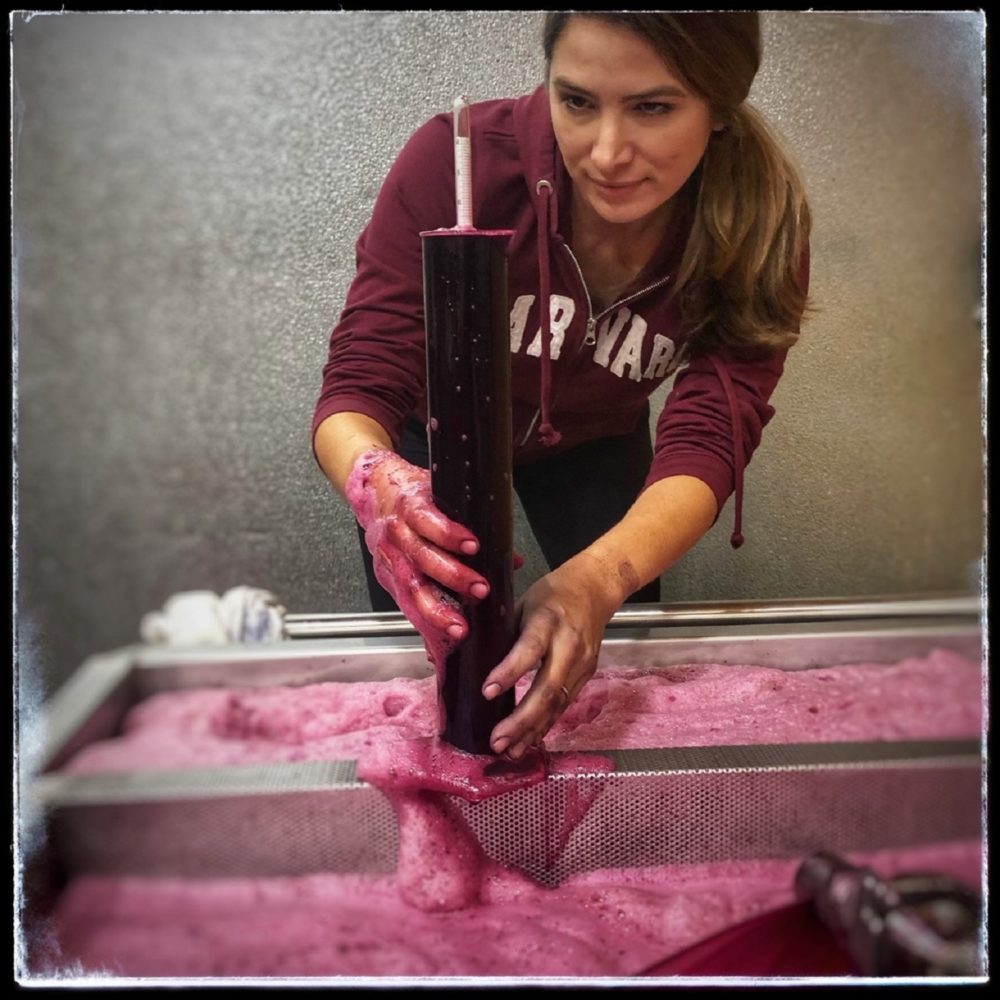
Julia draws an analogy, explaining how hard it was for her to bond with her newborn niece, Everett, who was born during the pandemic. “It’s impossible to get to know a baby during Covid when you can’t hold them. If I’m sitting six feet away from her and I’m waving, it doesn’t compute for her. Baby’s need skin to skin contact, daily contact. You need that in order to know a child. That applies to the wine: I can only get to know it if I’m in the cellar every day; unless your hands are in it, you don’t know it. As with anything you do in life, you have to be willing to be present and put up with the challenges in order to really get to know something.”
Their commitment to detail is the foundational philosophy of Fingers Crossed. “My dad says something along the lines of, ‘Do everything that everyone says they’re doing.’ When you don’t cut any corners, great things are possible, Nikolas says. “How you do anything is how you do everything. Even though every small task may add up to only a fraction of a percent, multiply that over two years, and you really move the quality needle. But this no-compromise approach is costly. We’re fortunate that we have great fans who are willing to pay 120 dollars for a bottle. And so we’re able to make a very little bit of wine the best way we know how, and still kind of make it work. But, if I had to sell that same wine for 15 dollars a bottle, guess what, we’re out of business. It’s over,” he says. “We don’t have a scale up plan,” Julia adds. “We have such respect for the people who can scale and make great wine, but we’re just not even close to imagining that.”
Do they hope their young children will become interested in wine? “A hundred percent I hope they will!” Nikolas exclaims. Their children smell all the wines during blending trials and perform various chores around the winery, including their favorite, spraying out picking bins. “I would love it if I got to have my children work alongside me until I get old and crotchety. That would be a dream.” When I ask Julia if she hopes either one of their children goes into psychiatry, she’s ruminative. “Depending upon the day you talk to me, I have different views about medicine as a career. My mom was a picture framer growing up and had her own shop, and I spent the bulk of my childhood there. I loved being there. She had all these art books – huge bins filled with art you could just thumb through. She used to pay me a dollar an hour to clean all the displays, meet with customers.” Because of the confidential and often disturbing aspects of psychiatry, Julia is not able to enjoy a “take your child to work day” with her kids. “It’s been a sad thing for me. I have a romanticism about working with your parents and teaching children at a young age about the value of money and hard work. We really try to instill that in our kids.” Daughter Mila, who is six, has grown accustomed to negotiating her hourly rate for chores that she performs around the winery, including vacuuming, which she favors. Enzo, their son, is a budding artist and, during the pandemic, would spend up to six hours a day drawing and making art. “He’s seven, but I think he’s quite talented. We tell him that a big part of our company is art, so we want to see what he’s making. He likes to create things. He’s a person who wants to make something. His favorite tool is the hot glue gun. He’ll make board games, figurines, comic books… We really want to promote that. People who have artistic temperaments need that to be acknowledged. He wants to go into a hole, work on his art, not be interrupted, and be praised for his work. We want to nourish that.”
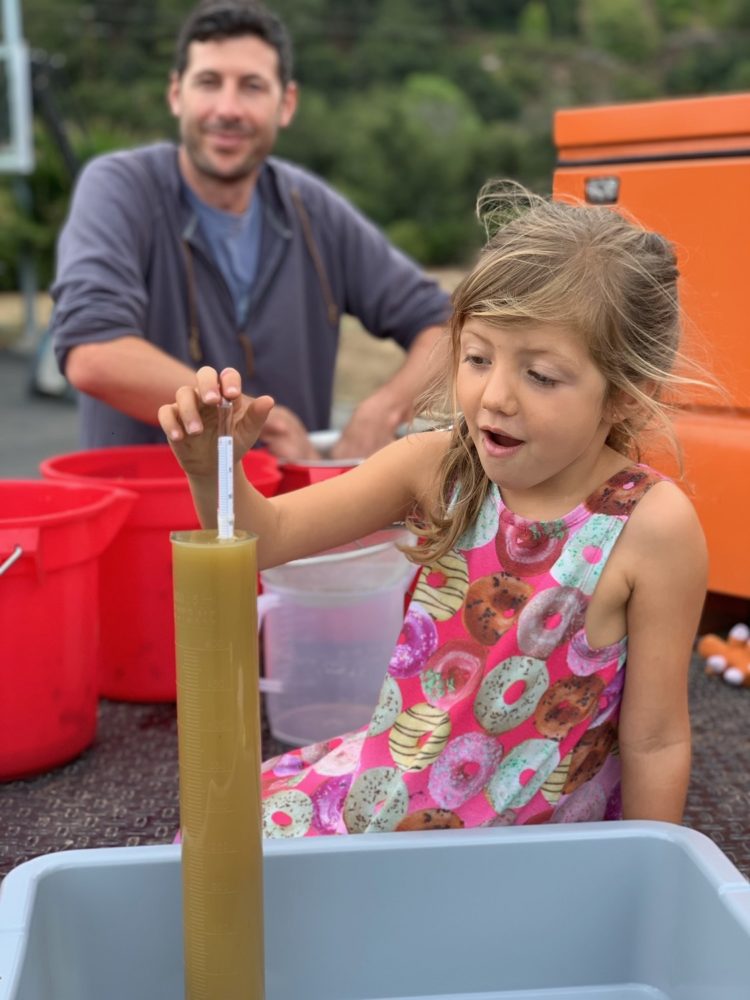
From a winemaking perspective, it might make more sense for the Krankls to live in nearby Santa Barbara County, but Ojai, they say, feels much more like home. “People are kind, friendly, down-to-earth, and non-judgmental. They support the arts, kids, local businesses, and artisans. Spending time in nature is the way of life in Ojai. We practically lived on a hiking trail this past year. Ojai locals are open-minded and there are people here from all walks of life, “ Julia says. “People have differing views, but it’s all respectful. I love to listen to people who have a completely different perspective of the world than I do. That’s how you learn. Living in Ojai for us has been a sanctuary, particularly during this past year.”
It appears Ojai serves in part as their muse as well, as the pair design their own labels – labels that will change every year. The 2018 wines are under labels featuring just a glimpse of Julia’s face. They created this label utilizing a technique called emulsion lift or photo transfer from Julia’s self-portrait. It’s an outdated process that involves shooting a Polaroid picture and then separating the film from the paper backing. The Krankls then transferred the image onto watercolor paper and distorted it. Previous labels featured a pair of hands holding a rosary – an image Nikolas created using a woodcut. Their bottles are hand-wrapped in tissue paper and sealed with an elegant stamp. “Why do we wrap presents, if it weren’t for the drama of it all,” Nikolas says. “And for the excitement and build up. It’s a fun process to take off the tissue paper, get to cut the wax. No one needs wine. It’s just a pure fun thing. What we’re trying to do is take the idea of what’s fun and put a big multiplier on that and make the enjoyment of Fingers Crossed as fun as possible. We just want it to be enjoyable because that’s its only purpose.”
2018 Fingers Crossed White Wine: This golden-hued cuvée – comprised of 72% Roussanne (Cumulus Vineyard), 24 % Chardonnay (Bien Nacido Vineyard) and 4% Viognier (White Hawk Vineyard) – is a profound white wine of great depth and nuance. It took me back to my childhood and the smell of my aunt’s kitchen when she baked Portuguese sweetbread, while the fruit trees in her backyard were in full blossom. The aromatics are hyper-lifted, the texture sublime, and the finish impossibly long. Decanting this wine will serve it well. It’s a well-made chameleon of a wine, revealing sensory surprises minute upon minute. $79.00
2018 Fingers Crossed Grenache: At 75% Grenache, this outstanding wine is completed with 11% Mourvèdre, 11% Syrah and 3% Roussanne. The vineyard sources include The Third Twin, Cumulus, and the Sebastiano Vineyard in Sta. Rita Hills. Long my favorite grape variety, I tend to set a very high bar when it comes to Grenache and find myself comparing every Grenache I’ve ever tasted to Rayas. That approach didn’t suit me here, for the 2018 Fingers Crossed Grenache shatters new paradigms of this variety’s typicity. Somehow, it’s found a voice at these vineyard sources – and in these hands – that reaches the pinnacle of Rayas, at least for me, though they’re nothing alike. This wine was for me a quiet revelation. Deeply beautiful and unforgettable. $120.00
2018 Fingers Crossed Syrah: An age-worthy, complex iodine elixir. Because it has such profundity – a kind of violet pastille-tinged texture that pleases the tongue and stirs the memory – it ought to be granted sufficient time and consideration. One might pour this wine and find that six hours later, it’s still evolving and revealing new depths and sensations. The fruit, sourced from Bien Nacido, Sebastiano, The Third Twin, and Cumulus, comes in at 93% Syrah, 2% Grenache, 2% Mourvèdre and 3% Roussanne. One of the best representations of American Syrah I’ve had the pleasure to drink. $120.00

